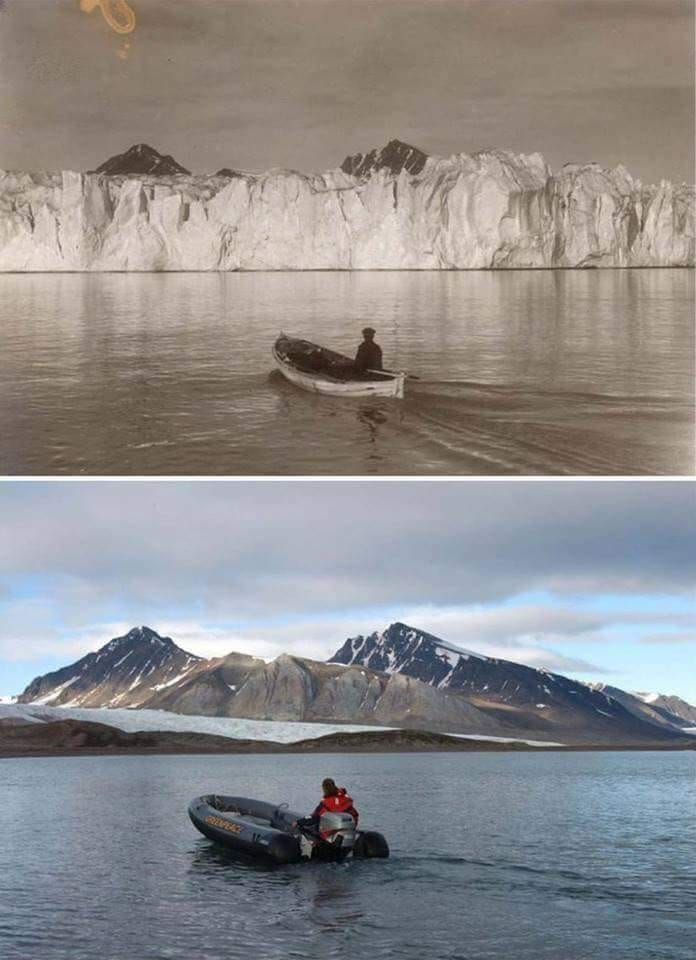Less
"It's important to think. It's what separates us from lentils." - Jack Fisher, The Fisher King

Despite being exhausted, I spent a few hours the other night staring at the sky looking at the incredible light display in the sky that was caused by an 'extreme' G5 geomagnetic storm reaching Earth this past week. It was a nice distraction, particularly on my social network reading, as everyone was posting beautiful imagery of things happening above them. Oddly, it was almost like we were united in a unified break from the constant cycle from the consistent bombardment of dismay, wars, corruption, disasters, politics, protests, diseases, or whatever else makes a good story on the evening news.
There was something calming about the whole thing.
This is the opposite of how everything in the world seems right now. I wrote about this feeling that we all missed an opportunity to reset what "normal" is after the pandemic, but 2024 seems even to be more intense.
There's too much of everything.
There is too much streaming. Too much anger. Too much politics. There are too many necessary things going on in the day-to-day. Too many things are being made that people don't even really want. (See the outrage around Apple's new iPad ad; some going as far as saying it was tone-deaf and powerfully shows 'The Destruction of the Human Experience').
(Maybe? I don't know, when I first saw it, I didn't think about it, and admittedly, I laughed when they crushed the emoji, but I get what people are upset about.)
Somebody pointed out that running the ad in reverse would've been a better ad for Apple - that these devices can enable much creativity instead of destroying what people hold dear.
But as I spend too much time thinking about everything, I keep returning to this idea of "clutter."
As we prepare to move to our "life 2.0" house, I've been strangely paying attention to how much clutter we have accumulated and on a mission to see what I can get rid of. Do I need this item? Does it bring me joy? Too much stuff.
And, then it hit me: There's so much clutter every day; there's no time left to do the real things.
It's all around us. All day, every day.
In 'We have a content quality problem, not a content quantity problem':
We've left behind scattered ruins of journalistic institutions, studios and artists and here we are with endless content options. The river of content sludge won't stop, because the folks responsible for generating it are too busy looking at their balance sheets to notice that folks are drowning in it.
We can't use algorithms to filter for quality because they're not designed to. They're designed to steer you towards whatever's most profitable for their creators.
That puts the onus on us, as users, to filter out the noise and that is increasingly difficult. I have old movies to watch and a narrow set of new ones I'm interested in.
It's important to remember that "stress is doing something you don’t care about, with time that you do.."
And that is where all this clutter rears its ugly head.
I've written before about this when I first read the excellent book, Essentialism:
The prevalence of noise: Almost everything is noise, and a very few things are exceptionally valuable. This is the justification for taking time to figure out what is most important. Because some things are so much more important, the effort in finding those things is worth it.
So yeah, in addition to physical clutter, all this mental clutter can also weigh heavily on one's brain. It's more important than ever to take steps to declutter your thoughts and quiet your mind, whether through meditation, journaling, or simply taking a few moments to breathe deeply and center yourself.
Identify what truly matters to you and prioritize those aspects. Let go of the unnecessary commitments, possessions, and thoughts that weigh you down and consume your time and energy.
Funny enough, when thinking about this, I came across a wonderful new company: The Calm Company. On their site, there's a list of values and traits that comprise the ideals of a calm company. Some are obvious — you need to be profitable and have sustainable growth, etc.- but a few of these stuck out.
I've added several of these ideas to my commonplace journal to make sure I keep coming back to it.
- Calm Companies have a strong sense of purpose: "What are we building this company for?" Generally, there's an internal purpose: "to improve the lives of the people working here," and an external purpose: "to help more creators get their message into the world."
- Freedom and Flexibility: As founders, we build businesses to give us more freedom. A Calm Company gives team members the flexibility to live well, pursue hobbies, exercise, take breaks, go on trips, and connect with family and friends.
- Fun: Calm Companies produce more opportunities for fun. "What if we ran this event?" "What if we went on a team retreat in the mountains?" "What if we put an easter egg on our website that plays a silly song?" "What if we made some fun stickers?"
- Mindful: At a Calm Company, decisions and commitments are made mindfully. We ask: will this decision make our lives worse? More stressful? Does it align with our values? Will this commitment add too much weight to our culture?
- Calm Work Environment: Stress and chaos are replaced with clear work goals, boundaries, and communication.
Lots of good stuff in there.
That's a good place to end this rambling; things would be better if we used calm company principles in everyday life.
I've been listening to Blink-182's "One More Time" on repeat for the last several weeks. The song reminds me to focus on the present and the essentials and prioritize personal relationships over mundane or superficial tasks that clutter day-to-day life.
Cutting through all that noise and focusing on real-life interactions and moments is, in the end, what matters most.
If you enjoy these posts, you can subscribe to Club Mako ($1/mo) 📆, buy me a coffee ☕️, check out the store or just share my work. If you'd rather just keep up with my ramblings, follow me via your favorite RSS reader or via Mastodon. Your support is much appreciated!
Exploration 🧭
In 'A good image tells a good story,'' the exquisite folks at IA (which makes up the outstanding IA Writer, which I write makoism.com with) have a thoughtful piece on the importance of selecting the right images for storytelling in presentations.
The right visual can attract people’s attention and explain complex matters at one sight. Yet, just as a misplaced joke can ruin a comedy set, boring or inappropriate images can derail and devalue your presentation. So, how do we choose the right ones?
I highly recommend reading (and buying their products; I just ordered their new notebook) if you enjoy effectively communicating complex concepts and want to make a lasting impression on your audience.
On a completely different note, I've been following the crazy 'Coyote vs Acme' saga. For those unfamiliar with the title, it's a live-action/animated legal comedy with the plot any Looney Toons fan would love to see:
After every product made by the Acme Corporation has backfired on Wile E. Coyote in his pursuit of the Road Runner, a down-and-out billboard human attorney represents Wile E. in his lawsuit to sue Acme. A growing friendship between Wile E. Coyote and his lawyer motivates their determination to win the court case, as it pits them against the intimidating boss of Wile E.'s lawyer's former law firm, who now represents Acme.
In November of 2023, Warner announced that the film had been completed, a project that had cost them a whopping $70m. However, despite its completion, they made a surprising decision to release it. Instead, they opted for a tax write off of $30m or the possibility of selling it to a third party like Netflix.
Ultimately, the decision was not about cinematic merit - it was about accounting.
We might complain today about pop culture governed by algorithms and data, but it’s not as though 20th-century decisions about which movies hit Blockbuster or which songs dominated the radio were based on some high-minded meritocracy; we have always been at the mercy of boardrooms.
What has changed is our awareness of how such things work. There was a time when only the subscribers of Hollywood trade magazines knew much about which movies were in development, to say nothing of which were canned. But audiences today are as intimately acquainted with upcoming projects as they are with the financial maneuvering behind them.
Here's a gift article from the NYT on the messy thing.
To Watch 📺
I just thought this was brilliant...
Quotables 📚
A sad look at the melting ice caps over the 100 years via @RustyBertrand

A fun article from Vox which analyzes Shakespeare's 38 plays and breaks down the 74 deaths into a single, handy chart. Described as "lots of stabbings and 2 deaths by pie", enjoy:

And a wonderful reminder that little things add up to big ones over time via @FluentInFinance:
Reading 30 minutes a day is 20 books per year.
Saving $20 a day is $7,300 per year.
Making an extra $100 a day is $36,500 per year.
Focusing for 4 hours of deep work a day is 40 days per year.
Success is the compounding of small habits.
And small habits make a big difference.
Articles Worth Reading / Link Rot 🧠
Here are a few random findings that I thought would be interesting to share. It really is just a dump of things sitting in my "thats interesting" pile, that I threw some categories on for you to pick out what tickles your fancy.
Bonus content this week, as I'm declaring bankruptcy again and clearing out the backlog:
Thinking and Life 🫶🏻
- Endless growth
- Philosophers are studying Reddit’s "Am I the Asshole?"
- We Sometimes Disappear Into Ourselves
- How to Do Great Work
- Playing to Win or Playing Not to Lose
- You can choose to be kind
- Trying to Live Quietly Might Be A Virtue
Storytelling 👽
- "Just"
- Three Wins.
- Where I'm coming from
- Minimum Viable Personality
- Chipping away at words, artist statement
- Cheap tricks for starting discussions in lectures
- Smarter networks through better narratives
Work 🎱
- Plan Your Career Around Problems
- On Opening Essays, Conference Talks, and Jam Jars
- Suicide Mission
- The Black Box
- The Tech Lead's Playbook
- Hierarchy is Good. Hierarchy is Essential. And Less Isn’t Always Better
Tech 📟
- We can have a different web
- Heat Death of the Internet
- The self-serving nature of most tech social media
- Gentler Streak quieted my evil brain goblin so I could run in peace
- Story Points Revisited
- Code as a Crime Scene
- AI in 2024: a brief state of play
- New Apple Watch data shows the average person takes 334 days to walk/run a marathon
- Why do we use social media?
- Embracing Chaos to Improve System Resilience: Chaos Engineering
- How the Internet Gets Inside Us
Privacy 🕵🏻
Oddities 🤔
Recommended 🎸
June is going to be a fun month for series returning: The Boys Season 4 (June 13), The Bear Season 3 (June 27), and House of the Dragon Season 2 (June 16).
Here's a recap of the first season of House of the Dragon as you get ready to 'bend the knee'.
Be well. ✌🏻
